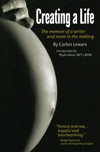Creating a Life
In her memoir Creating a Life, Corbin Lewars chronicles her difficult journey to motherhood. Along the road there is a miscarriage, unearthed memories of being raped as a teenager, a struggle to find meaningful work, and tough decisions about the birth itself: hospital or home? Drugs or “natural” childbirth?
In her memoir Creating a Life, Corbin Lewars chronicles her difficult journey to motherhood. Along the road there is a miscarriage, unearthed memories of being raped as a teenager, a struggle to find meaningful work, and tough decisions about the birth itself: hospital or home? Drugs or “natural” childbirth?
Lewars is open and honest about her experiences and emotions, and doesn’t try to gloss over her own failings. In fact, the reader may occasionally feel sorry for Jason, her long-suffering husband; dealing with her traumatic rape experience plus her pregnancy hormones sometimes makes her the housemate from Hell. Lewars’s writing is so straightforward that it sounds more like talking or writing in a diary; while this makes for an easy read, occasionally I found myself wishing she had taken a few more pains describing her emotions or experiences. Her flat, matter-of-fact presentation sometimes makes a very poignant or traumatic experience seem less so. And some of her women friends are ready for sainthood; their advice sounds less like actual talking, and more like reading from a brochure. For instance, one woman, when Lewars asks her about home birth in a phone conversation, says this (uninterrupted):
“Once I became pregnant, I educated myself about the risks, pros and cons of a home birth. Intuitively, I knew that’s what I wanted, but researching it convinced me. It seems we too often go down the path of fear, of ‘what if,’ rather than trusting our own strength and ability to go through the pain and exhaustion and come out the other side strong and proud and absolutely ecstatic. I knew I was capable of giving birth on my own, with the help of a midwife, and it seemed the more that women give up that strength and confidence in their bodies, the more likely the birth will end up not being what they wanted.”
Maybe Lewars has more articulate friends than I do, but I know no one who talks like this on the phone.
Style issues aside, Lewars’s memoir brings some important issues into the open: how far does violation have to go to be called “rape”? Who should be in charge of the birth experience, the woman or the doctors? Is home birth an irresponsible choice? I learned a lot about home birth, the procedures involved, and the responsibilities of a doula versus a midwife. Her book also made me think about how much control I give up to a doctor, rather than listening to my own body.
Anyone considering a home birth should read this book. Lewars describes the experience in detail, and also tells how she found her midwife and doula. If you’re squeamish about childbirth description, this is not the book for you; Lewars doesn’t spare the reader a single drop of fluid, blood or mucus. Of course, if you’re pregnant AND squeamish: go ahead and read. You’ve only got nine months to get over it.





